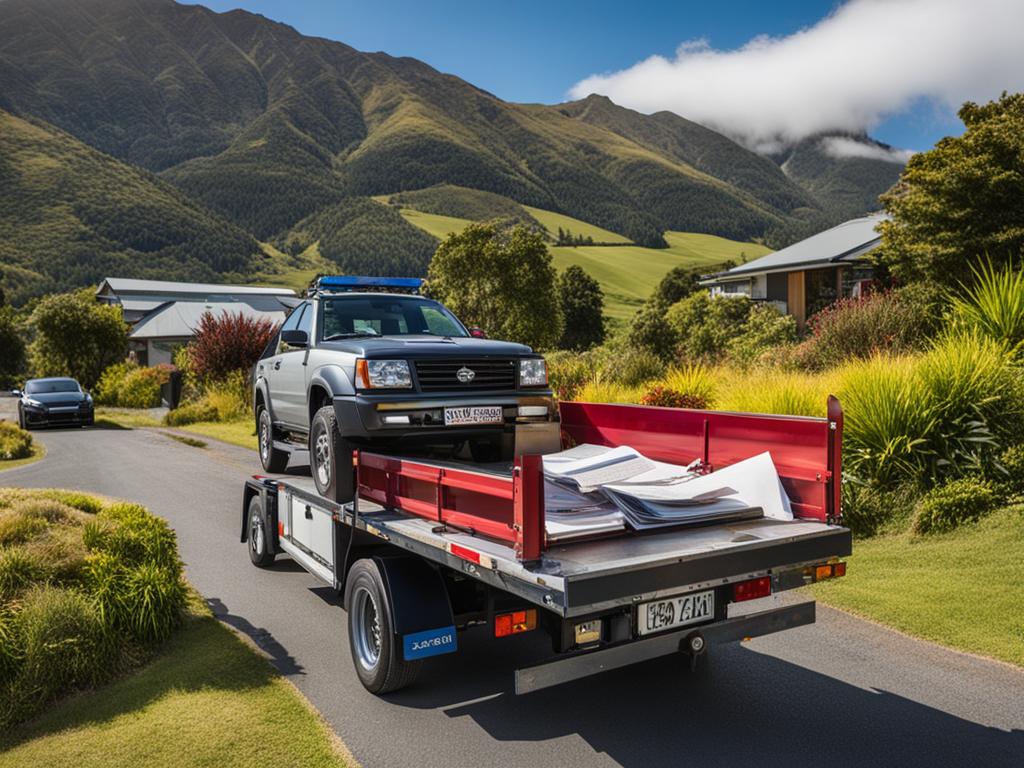Selling a car that doesn’t run can be a challenging process in New Zealand, but with the right guidance, it is possible to maximize your profit. Whether you’re dealing with a non-functioning engine or other mechanical issues, there are options available to help you sell your car effectively and efficiently.
Key Takeaways:
- Research the market value of your non-running car in NZ to determine the selling price.
- Consider selling privately for potentially higher profits, but be prepared to invest more time and effort.
- If selling privately, create an appealing listing with detailed descriptions and high-quality photos.
- Get a reliable car valuation using tools like Trade Me’s Value My Car or BestCar.
- Alternatively, trade-in your non-running car at a dealership for convenience, but expect a lower trade-in value.
Get a Reliable Car Valuation
Before you sell your car, it’s crucial to get an accurate valuation to ensure you don’t undersell it. Two reliable tools you can use for free car valuations in NZ are Trade Me’s Value My Car and BestCar. These online tools provide estimations based on various factors such as the make, model, condition, and service history of your car.
If you need more data points, you can also search for similar cars on Trade Me to get an indication of their current prices. This can give you a better understanding of the market value and guide you in setting a competitive selling price.
For a more comprehensive valuation and detailed vehicle history report, you may consider using paid options such as MotorWeb and CarJam. These services offer more in-depth information about your car’s condition, previous owners, and any outstanding finance or legal issues.
Example Table: Comparison of Free Car Valuation Tools
| Car Valuation Tool | Key Features | Accuracy | Price |
|---|---|---|---|
| Trade Me’s Value My Car | – Estimations based on make, model, condition, and service history | Good | Free |
| BestCar | – Estimations based on make, model, condition, and service history | Good | Free |
Ensure that you provide accurate and detailed information about your car’s condition when using these car valuation tools. Any misinformation may lead to inaccurate estimates.
By utilizing these car valuation tools, you can have a better understanding of your car’s worth and price it competitively, ensuring a fair sale and maximizing your profit potential.
Selling Your Car Privately vs. Trading In at a Dealership
When it comes to selling a car that doesn’t run, you have two options: selling it privately or trading it in at a dealership. Each option has its own advantages and considerations.
Selling Privately
Selling your car privately allows you to potentially get a higher price for your non-running car. This is because you can negotiate directly with potential buyers and set your own asking price. Additionally, when selling privately, you have more control over the selling process and can take the time to find the right buyer.
- Advantages of selling privately:
- – Potential for a higher selling price
- – More control over the selling process
- – Ability to negotiate directly with buyers
However, selling privately also requires more effort and time on your part. You’ll need to create appealing listings, respond to inquiries, and handle negotiations. It’s important to thoroughly prepare your car and provide accurate descriptions to attract potential buyers.
Trading In at a Dealership
If convenience is your priority, trading in your non-running car at a dealership can be a viable option. Dealerships typically accept trade-ins regardless of the condition of the vehicle, including non-functioning cars. Trading in at a dealership allows you to bypass the hassle of finding individual buyers and negotiating on your own.
- Advantages of trading in at a dealership:
- – Convenience of a one-stop selling process
- – Avoiding the need to negotiate with individual buyers
- – No need to handle paperwork or advertising
However, it’s important to note that the trade-in value offered by dealerships is usually lower than what you could get by selling privately. This is because the dealership needs to account for the cost of repairing or reselling the non-running car.
Consider your priorities, the condition of your car, and the time and effort you’re willing to invest in the selling process to determine which option is best for you.
Tips for Selling a Car with Mechanical Issues
If you’re looking to sell a car with mechanical issues in New Zealand, there are several important tips to keep in mind. Transparency is key when it comes to describing the mechanical problems your car has, as it builds trust with potential buyers. Clearly outline any issues and provide as much information as possible to avoid any future disputes.
One way to increase buyer confidence is to have a mechanic assess your car and provide a report on its condition. This can help potential buyers understand the extent of the mechanical problems and make an informed decision. Highlighting any recent repairs or maintenance work you’ve done can also be beneficial, as it shows that you’ve taken care of the car despite the issues.
Pricing is another crucial aspect when selling a car with mechanical problems. It’s important to price your car competitively, taking into account its condition and the cost of potential repairs. Research similar cars on the market to get a better understanding of the price range and adjust accordingly. A fair and reasonable price will attract more potential buyers.
| Tip | Explanation |
|---|---|
| Be transparent | Clearly describe the mechanical issues to potential buyers. |
| Get a mechanic’s assessment | Having a professional assessment can increase buyer confidence. |
| Highlight recent repairs | Show that you’ve taken care of the car despite the issues. |
| Price competitively | Research the market and set a fair price considering the condition and potential repairs. |
Selling a car with mechanical issues can be challenging, but with the right approach, you can find a buyer who is willing to take on the project. By being transparent, getting a mechanic’s assessment, highlighting recent repairs, and pricing competitively, you can increase your chances of selling your car successfully.
Buying from a Private Seller with Mechanical Problems
When considering buying a car with mechanical problems from a private seller in New Zealand, it is important to exercise caution and be aware of your rights as a buyer. Unlike dealerships, private sellers are not bound by the same consumer laws, but there are still protections in place under the Contract and Commercial Law Act (CCLA). It is essential to thoroughly inspect the car, ask for maintenance and repair records, and consider seeking a mechanic’s assessment before making a purchase.
Inspecting the car in person allows you to closely examine its condition and identify any potential issues. Look for signs of wear and tear, leaks, or any visible mechanical problems. Requesting maintenance and repair records will give you insight into the car’s history and help you assess its overall reliability. A mechanic’s assessment can provide an expert opinion on the extent of the mechanical problems and the potential cost of repairs.
Under the CCLA, if the seller provides false or misleading information about the car’s condition or any outstanding finance, you may have legal protections. If you encounter any issues with the car that were not disclosed by the seller, you may be entitled to a refund or compensation. It is important to document any communication with the seller and gather evidence to support your claim, such as photographs or written statements.
It is always advisable to exercise due diligence when buying from a private seller. By thoroughly inspecting the car, requesting maintenance and repair records, and considering a mechanic’s assessment, you can make an informed decision and protect yourself as a buyer.
Understanding Your Rights
When buying from a private seller, it is important to be aware of your rights and responsibilities. While private sellers are not legally required to provide warranties or guarantees, they must not mislead or deceive buyers. If you encounter any issues with the car that were not disclosed, the CCLA provides recourse for refunds or compensation. However, it is essential to gather evidence and seek legal advice if necessary.
It is also worth noting that buying a car with mechanical problems from a private seller may exclude you from certain protections, such as the Consumer Guarantees Act which applies to purchases from businesses. Therefore, it is crucial to thoroughly evaluate the condition of the car and assess the risks before finalizing the purchase.
| Summary of Rights: | Actions to Take: |
|---|---|
| Thoroughly inspect the car | Look for signs of wear, leaks, or mechanical problems |
| Request maintenance and repair records | Assess the car’s history and reliability |
| Consider a mechanic’s assessment | Gain expert opinion on the extent of the mechanical problems |
| Document any communication with the seller | Gather evidence to support your claim if issues arise |
| Consult legal advice if necessary | Understand your legal rights and seek appropriate action |
Selling a Car with Mechanical Problems to Atlas Auto
If you want a hassle-free and quick way to sell your car with mechanical problems, consider selling it to Atlas Auto. They buy cars in any condition, whether they’re damaged, wrecked, or have mechanical issues. The process is simple: request an offer for your vehicle, accept the offer if it’s satisfactory, and get paid cash on the spot. Atlas Auto will handle the car pickup at no cost to you. This eliminates the need to deal with potential lowball offers or the uncertainty of auctions.
When selling a car with mechanical problems, finding a buyer who is willing to take on the repairs can be a challenge. Many private buyers and dealerships may shy away from purchasing a non-functioning vehicle. However, Atlas Auto specializes in buying cars with mechanical issues, providing a convenient solution for sellers.
By selling your car to Atlas Auto, you can avoid the hassle of advertising and negotiating with potential buyers. You don’t have to spend time and money fixing the mechanical problems or worry about potential liabilities once the car is sold. Atlas Auto understands the value of salvageable parts and will offer a fair price for your car, taking into account the extent of the mechanical issues.
Whether your car has a blown engine, transmission problems, or any other mechanical issues, Atlas Auto is willing to make an offer. They have the expertise and resources to properly assess the value of your car and provide you with a competitive offer. Selling your car to a reputable company like Atlas Auto can save you time, effort, and stress, allowing you to move on from your non-functioning vehicle quickly and easily.

Table: Comparison of Selling Options for a Car with Mechanical Problems
| Selling Option | Advantages | Disadvantages |
|---|---|---|
| Selling to Atlas Auto | Quick and hassle-free process, cash payment on the spot, free car pickup | Potentially lower price compared to selling privately, limited negotiating power |
| Selling Privately | Potential for higher price, more control over the selling process | Time-consuming, need to handle advertising, negotiations, and paperwork |
| Trading in at a Dealership | Convenience, no need to deal with private buyers | Lower trade-in value, especially for a non-functioning car |
Conclusion
In conclusion, selling a car that doesn’t run in NZ can be a challenging process, but it is not impossible. By following the right steps and considering your options, you can maximize your profit and find a suitable buyer. Whether you choose to sell privately or trade it in at a dealership, thorough preparation and accurate valuation are crucial.
Transparency is key when it comes to describing your car’s mechanical issues. Be honest with potential buyers to build trust and avoid any future disputes. Additionally, consider getting a mechanic’s assessment and highlighting any recent repairs or maintenance work to increase buyer confidence.
If you prefer a hassle-free and quick solution, selling your car to a reputable company like Atlas Auto can be a great option. They buy cars in any condition and provide a simple process with cash payment on the spot. This eliminates the need to deal with potential lowball offers or the uncertainty of auctions.
In summary, take the time to research the market value of your car, create an appealing listing with great photos, and be transparent about any mechanical issues. Choose the option that best suits your needs and priorities, whether it’s selling privately, trading in at a dealership, or selling to a company like Atlas Auto. With the right approach and preparation, you can successfully sell your non-running car in NZ.
FAQ
Can I sell a car that doesn’t run privately in NZ?
Yes, you can sell a non-running car privately in NZ. It may require more time and effort, but it can potentially fetch a higher price.
How can I determine the value of my non-running car?
You can use free car valuation tools like Trade Me’s Value My Car and BestCar to get an estimation. Paid options like MotorWeb and CarJam offer more detailed valuations.
Is it better to sell a car privately or trade it in at a dealership?
Selling privately may get you a higher price, but it requires more effort. Trading in at a dealership offers convenience, but the trade-in value is usually lower.
How should I describe the mechanical problems of my car when selling?
It’s important to accurately describe the mechanical problems to potential buyers. Transparency is key to avoid future disputes.
What should I consider when buying a car with mechanical problems from a private seller?
Inspect the car thoroughly, ask for maintenance records, and consider getting a mechanic’s assessment before making a purchase.
Can I sell a car with mechanical problems to Atlas Auto?
Yes, Atlas Auto buys cars in any condition, including those with mechanical issues. They offer a hassle-free process and cash payment on the spot.




